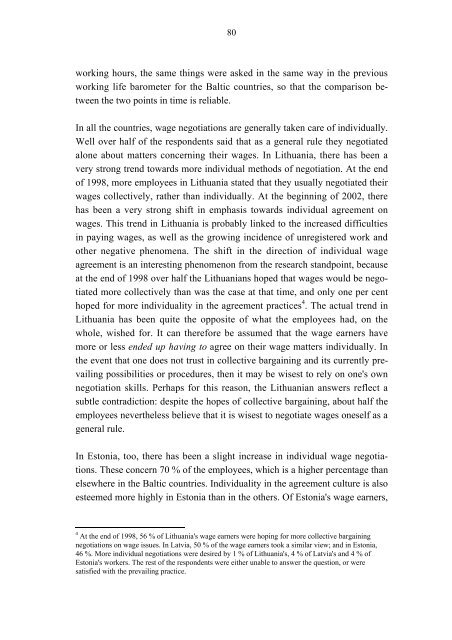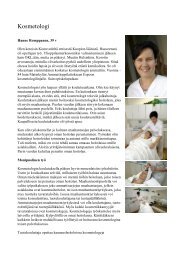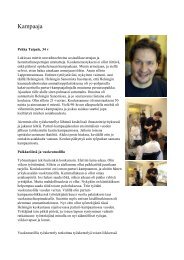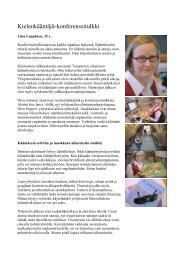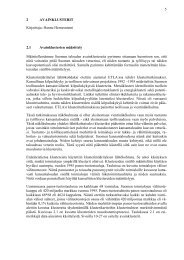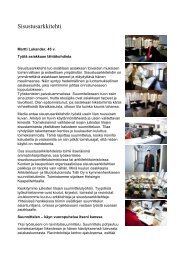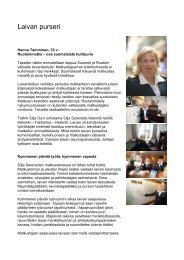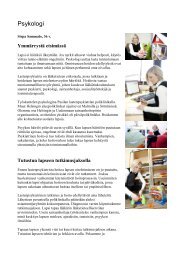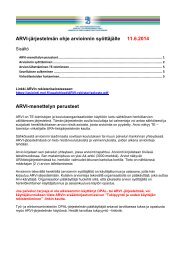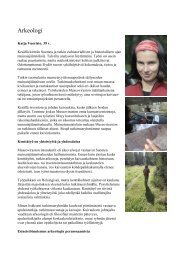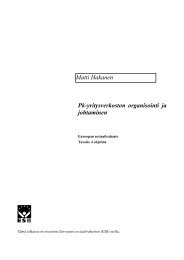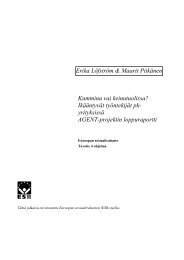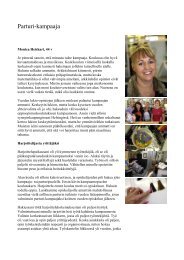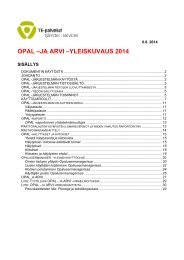Working Life Barometer in the Baltic Countries 2002 (pdf) - mol.fi
Working Life Barometer in the Baltic Countries 2002 (pdf) - mol.fi
Working Life Barometer in the Baltic Countries 2002 (pdf) - mol.fi
You also want an ePaper? Increase the reach of your titles
YUMPU automatically turns print PDFs into web optimized ePapers that Google loves.
80<br />
work<strong>in</strong>g hours, <strong>the</strong> same th<strong>in</strong>gs were asked <strong>in</strong> <strong>the</strong> same way <strong>in</strong> <strong>the</strong> previous<br />
work<strong>in</strong>g life barometer for <strong>the</strong> <strong>Baltic</strong> countries, so that <strong>the</strong> comparison between<br />
<strong>the</strong> two po<strong>in</strong>ts <strong>in</strong> time is reliable.<br />
In all <strong>the</strong> countries, wage negotiations are generally taken care of <strong>in</strong>dividually.<br />
Well over half of <strong>the</strong> respondents said that as a general rule <strong>the</strong>y negotiated<br />
alone about matters concern<strong>in</strong>g <strong>the</strong>ir wages. In Lithuania, <strong>the</strong>re has been a<br />
very strong trend towards more <strong>in</strong>dividual methods of negotiation. At <strong>the</strong> end<br />
of 1998, more employees <strong>in</strong> Lithuania stated that <strong>the</strong>y usually negotiated <strong>the</strong>ir<br />
wages collectively, ra<strong>the</strong>r than <strong>in</strong>dividually. At <strong>the</strong> beg<strong>in</strong>n<strong>in</strong>g of <strong>2002</strong>, <strong>the</strong>re<br />
has been a very strong shift <strong>in</strong> emphasis towards <strong>in</strong>dividual agreement on<br />
wages. This trend <strong>in</strong> Lithuania is probably l<strong>in</strong>ked to <strong>the</strong> <strong>in</strong>creased dif<strong>fi</strong>culties<br />
<strong>in</strong> pay<strong>in</strong>g wages, as well as <strong>the</strong> grow<strong>in</strong>g <strong>in</strong>cidence of unregistered work and<br />
o<strong>the</strong>r negative phenomena. The shift <strong>in</strong> <strong>the</strong> direction of <strong>in</strong>dividual wage<br />
agreement is an <strong>in</strong>terest<strong>in</strong>g phenomenon from <strong>the</strong> research standpo<strong>in</strong>t, because<br />
at <strong>the</strong> end of 1998 over half <strong>the</strong> Lithuanians hoped that wages would be negotiated<br />
more collectively than was <strong>the</strong> case at that time, and only one per cent<br />
hoped for more <strong>in</strong>dividuality <strong>in</strong> <strong>the</strong> agreement practices 4 . The actual trend <strong>in</strong><br />
Lithuania has been quite <strong>the</strong> opposite of what <strong>the</strong> employees had, on <strong>the</strong><br />
whole, wished for. It can <strong>the</strong>refore be assumed that <strong>the</strong> wage earners have<br />
more or less ended up hav<strong>in</strong>g to agree on <strong>the</strong>ir wage matters <strong>in</strong>dividually. In<br />
<strong>the</strong> event that one does not trust <strong>in</strong> collective barga<strong>in</strong><strong>in</strong>g and its currently prevail<strong>in</strong>g<br />
possibilities or procedures, <strong>the</strong>n it may be wisest to rely on one's own<br />
negotiation skills. Perhaps for this reason, <strong>the</strong> Lithuanian answers reflect a<br />
subtle contradiction: despite <strong>the</strong> hopes of collective barga<strong>in</strong><strong>in</strong>g, about half <strong>the</strong><br />
employees never<strong>the</strong>less believe that it is wisest to negotiate wages oneself as a<br />
general rule.<br />
In Estonia, too, <strong>the</strong>re has been a slight <strong>in</strong>crease <strong>in</strong> <strong>in</strong>dividual wage negotiations.<br />
These concern 70 % of <strong>the</strong> employees, which is a higher percentage than<br />
elsewhere <strong>in</strong> <strong>the</strong> <strong>Baltic</strong> countries. Individuality <strong>in</strong> <strong>the</strong> agreement culture is also<br />
esteemed more highly <strong>in</strong> Estonia than <strong>in</strong> <strong>the</strong> o<strong>the</strong>rs. Of Estonia's wage earners,<br />
4 At <strong>the</strong> end of 1998, 56 % of Lithuania's wage earners were hop<strong>in</strong>g for more collective barga<strong>in</strong><strong>in</strong>g<br />
negotiations on wage issues. In Latvia, 50 % of <strong>the</strong> wage earners took a similar view; and <strong>in</strong> Estonia,<br />
46 %. More <strong>in</strong>dividual negotiations were desired by 1 % of Lithuania's, 4 % of Latvia's and 4 % of<br />
Estonia's workers. The rest of <strong>the</strong> respondents were ei<strong>the</strong>r unable to answer <strong>the</strong> question, or were<br />
satis<strong>fi</strong>ed with <strong>the</strong> prevail<strong>in</strong>g practice.


